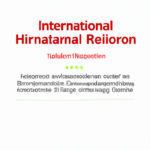Power dynamics play a crucial role in shaping international regimes. These dynamics refer to the relations of power that exist among states and other actors within the international system. International regimes, on the other hand, are the rules, norms, and principles that govern and guide interaction among states in specific issue areas. The struggle for power often influences the creation, maintenance, and effectiveness of these regimes. Stronger states tend to exert more influence and shape the rules in their favor, while weaker states strive to assert their interests within these power dynamics. Understanding these dynamics is essential in comprehending the intricacies of international cooperation and conflict resolution.
Power dynamics and international regimes refer to the complex relationships between states in the global arena, characterized by the distribution and exercise of power. International regimes are typically formed to govern specific issue areas, such as trade, human rights, or the environment, and are comprised of rules, norms, and institutions that facilitate cooperation and coordination among states.
At the core of power dynamics within these regimes is the concept of power itself, which can be understood as the ability of actors to influence others and shape outcomes in their favor. In the context of international regimes, power can manifest in various forms, including military capabilities, economic resources, diplomatic leverage, and ideational influence.
The distribution of power within international regimes plays a significant role in shaping their functioning and outcomes. Typically, powerful states have the ability to set the agenda, shape the rules, and enforce compliance within these regimes. They often act as dominant actors, exerting their influence through coercion, diplomacy, or the provision of incentives. As a result, power dynamics within international regimes are often marked by a hierarchical structure, with powerful states enjoying greater decision-making authority and leverage over less powerful states.
However, power dynamics within international regimes are not static. They are constantly subject to change due to shifting national interests, emerging powers, and evolving global dynamics. In some cases, rising powers may challenge established power structures, seeking to reshape the norms and rules of international regimes to better align with their own interests. This can lead to complex negotiations and even power struggles between different actors within the regime.
Understanding power dynamics within international regimes is crucial for analyzing the dynamics of global governance and the effectiveness of international cooperation. By examining how power is distributed, exercised, and contested within these regimes, researchers can better understand the underlying drivers of cooperation, conflict, and the prospects for global governance in various issue areas.
Power dynamics in international regimes
Power dynamics in international regimes refer to the interactions and relationships between states or actors within international organizations or agreements. These dynamics are characterized by the distribution of power and influence among participating members, which ultimately shape decision-making processes and outcomes.
One of the key aspects of power dynamics in international regimes is the concept of hegemony. Hegemonic powers often exert significant influence over other participants in the regime, due to their economic, military, or political dominance. These powers can shape the rules, norms, and objectives of the regime to reflect and protect their own interests.
However, power dynamics within international regimes are not solely determined by hegemonic powers. Other factors, such as the size and capabilities of states, regional balances of power, and the influence of non-state actors, also play significant roles in shaping these dynamics.
The distribution of power in international regimes can have both positive and negative implications. On the positive side, greater power and influence often enable states to effectively advocate for their interests, mobilize resources, and drive change within the regime. Powerful states may thus play a crucial role in initiating and leading global initiatives to address pressing challenges such as climate change, human rights violations, or terrorism.
However, power dynamics can also lead to the exclusion or marginalization of less powerful states, limiting their ability to influence decision-making processes or shape the agenda of the regime. This imbalance of power can result in the dominance of certain interests or perspectives, potentially undermining the legitimacy and effectiveness of the regime itself. Furthermore, the pursuit of power by states may lead to conflicts and rivalries, as they compete for influence and control over key decision-making bodies.
To address these challenges, efforts have been made to promote more inclusive and equitable power dynamics within international regimes. Enhancing the representation and participation of less powerful states and non-state actors can help ensure that diverse perspectives and interests are taken into account. Strengthening the accountability and transparency of decision-making processes can also help mitigate the potential abuses of power within these regimes.
In conclusion, power dynamics in international regimes are fundamental to understanding how decisions are made, and their impact on global governance. These dynamics are influenced by factors such as hegemony, state capabilities, and the influence of non-state actors. Balancing power and addressing power imbalances within international regimes are essential for fostering legitimacy, inclusivity, and effectiveness in global governance.
sources of power in international relations
In the realm of international relations, various sources of power come into play, shaping the dynamics among nations and determining their influence on the global stage. These sources of power can be categorized into numerous factors, including military strength, economic capabilities, soft power, and diplomatic prowess. Understanding these sources is crucial for comprehending the complexities of international relations.
Military power stands as a prominent source of influence in international affairs. Nations possessing formidable military capabilities often have the ability to project power and protect their interests. The possession of advanced weaponry, well-trained armed forces, and strategic military alliances can significantly enhance a country’s standing on the global stage. Military power provides countries with a deterrent capability and the potential to exercise coercion or force in pursuit of their objectives.
Additionally, economic power plays a critical role in international relations. Countries with strong economies can shape global trade and financial systems, exert economic sanctions, and promote or hinder the development of other nations. Economic power encompasses factors such as GDP, trade volume, technological innovation, natural resources, and the ability to attract foreign investments. Economic strength not only creates a foundation for domestic stability and prosperity but also enhances a nation’s overall influence and leverage in international affairs.
Soft power is another significant source of influence, referring to a nation’s ability to attract and influence others through non-coercive means. It involves cultural, political, and ideological dimensions that shape a country’s perception and appeal on the international stage. Elements of soft power include a nation’s values and beliefs, cultural exports such as music and cinema, educational and scientific achievements, and the ability to be a role model or inspiration for others. Soft power is particularly valuable in shaping public opinion, building alliances, and promoting a nation’s interests through persuasion rather than coercion.
Diplomatic power is vital in international relations as it allows countries to effectively negotiate, mediate, and resolve conflicts. Diplomacy involves the skillful use of diplomacy, negotiation, and dialogue to advance a country’s interests and resolve disputes peacefully. Effective diplomacy requires a combination of expertise, cultural understanding, networking, and the ability to navigate complex international systems such as the United Nations and regional organizations. Nations excelling in diplomatic power can forge alliances, build consensus, and influence decision-making processes at the global level.
In conclusion, sources of power in international relations encompass military strength, economic capabilities, soft power, and diplomatic prowess. Each source contributes to a country’s overall influence and standing in the international community. Understanding and managing these sources of power are vital for nations seeking to protect their interests, promote stability, and forge effective partnerships on the global stage.
the role of coercion in international regimes
The role of coercion in international regimes is a significant aspect that shapes the dynamics and functioning of these systems. Coercion refers to the use of force, whether economic, military, or diplomatic, to compel compliance with certain rules and norms within international regimes. It is employed by powerful actors to exert influence and maintain dominance over weaker states or actors.
One key role of coercion in international regimes is its ability to establish and enforce compliance with the established rules and regulations. Coercive actions, such as economic sanctions or military interventions, serve as means to pressure states into adhering to the regime’s principles. By using coercion, powerful states assert their authority and ensure that their interests are protected.
Coercion also plays a role in shaping the power dynamics within international regimes. Powerful states often have the capacity and resources to exercise coercion more effectively, which can lead to unequal power relations. This imbalance of power can influence decision-making processes within international regimes, allowing dominant states to shape the rules and outcomes in their favor.
Furthermore, coercion can be used as a tool to address non-compliance or challenges to the established order within international regimes. When a member state fails to adhere to the regime’s rules, the threat or use of coercion can be employed as a means of punishment or deterrence. This can include imposing economic sanctions, military interventions, or diplomatic pressure to compel compliance.
However, coercion in international regimes is not without its limitations and potential negative consequences. Coercive actions can lead to resentment, resistance, or even backlash from targeted states or actors. Moreover, the use of coercion can sometimes undermine the legitimacy of the regime itself, particularly if it is perceived as a tool for advancing the interests of certain powerful actors at the expense of others.
In conclusion, coercion plays a crucial role in international regimes by establishing and enforcing compliance, shaping power dynamics, and addressing non-compliance or challenges. While it is a tool employed by powerful actors to exert influence and maintain control, it is not without limitations and potential negative consequences. Understanding the role of coercion in international regimes is essential for comprehending the dynamics and challenges associated with these systems.
power imbalances in global governance
Power imbalances in global governance refer to the unequal distribution of power among nations and organizations that participate in international regimes and collaborate on global issues such as security, trade, and the environment. These imbalances often arise due to differences in political, economic, and military capabilities among actors in the global arena.
One prominent example of power imbalances in global governance can be seen in the structure of international organizations such as the United Nations (UN), World Bank, and International Monetary Fund (IMF). These organizations were created to promote multilateral cooperation and provide a platform for member states to discuss and address global challenges. However, the voting power and decision-making authority within these institutions are often disproportionately distributed, favoring powerful countries.
The UN Security Council is a prime example of a global governance body where power imbalances are evident. It consists of five permanent members – the United States, Russia, China, France, and the United Kingdom – who hold veto power, enabling them to block any resolutions they oppose. This gives these five countries significant influence over global security decisions, while other member states have limited ability to shape international interventions or policies.
Another manifestation of power imbalances in global governance is seen in international trade agreements. Developed countries often dominate negotiations and shape the terms of trade agreements, while developing nations have less bargaining power due to their weaker economies and limited access to resources. This results in trade arrangements that may not adequately address the needs and interests of less powerful nations, perpetuating asymmetrical economic relationships.
Power imbalances also affect global environmental governance. Developed nations, which historically contributed the most to environmental degradation, have more resources and technological capabilities to address sustainability issues. Meanwhile, developing countries face resource constraints and have less influence in shaping global environmental policies. This puts them at a disadvantage in negotiations and limits their ability to advocate for their specific environmental concerns.
Addressing power imbalances in global governance is crucial for building a more inclusive and effective international system. Efforts should be made to reform international institutions and decision-making processes to ensure better representation and participation of all countries, regardless of their size or resources. This can promote a more equitable distribution of power and support the development of policies that are more responsive to the diverse needs and interests of the global community.
In conclusion, power imbalances in global governance hinder the effectiveness and legitimacy of international regimes. These imbalances are evident in voting structures, trade agreements, and environmental governance, where powerful actors often dominate decision-making processes. Recognizing and addressing these imbalances is important for promoting global cooperation and ensuring a fairer and more equitable international order.
the impact of power dynamics on decision-making within international regimes
The impact of power dynamics on decision-making within international regimes is a complex and multifaceted topic. Power dynamics play a crucial role in shaping decisions made within these frameworks, and understanding this relationship is essential for comprehending the functioning of international regimes.
Firstly, power asymmetries significantly influence decision-making within international regimes. Powerful states often wield a disproportionate amount of influence within these institutions, enabling them to shape the discourse and agenda. These states can use their power to advance their own interests, potentially marginalizing less powerful states in the decision-making process. As a result, decisions may reflect the preferences and priorities of the powerful, rather than being representative of the collective interests of all member states.
Moreover, power dynamics impact the bargaining power of states within international regimes. States with greater power resources have an advantage during negotiations, allowing them to secure favorable outcomes. Decision-making becomes a process of negotiation and compromise, where power asymmetries can heavily influence the final result. Powerful states may be able to assert their preferences and secure concessions from weaker states, further consolidating their influence within the regime.
Additionally, power dynamics can shape the institutional structures and rules governing decision-making within international regimes. Powerful states often have the ability to shape these structures to preserve their own interests and maintain their dominant position. This can result in decision-making processes that favor the powerful and limit the influence of less powerful states. For example, powerful states may have the ability to veto certain decisions or have a greater say in the appointment of key leaders within the regime.
Furthermore, power dynamics impact the legitimacy and effectiveness of decision-making within international regimes. When decisions are perceived to be driven primarily by the interests of the powerful, it can undermine the legitimacy and credibility of the regime. This can lead to skepticism and resistance from other states, potentially hindering the implementation and enforcement of decisions made within the regime.
In conclusion, power dynamics have a significant impact on decision-making within international regimes. These dynamics shape the agenda, bargaining power, institutional structures, and legitimacy of decision-making processes. Recognizing and understanding the influence of power dynamics is crucial for fostering a more inclusive and equitable decision-making framework within international regimes.
External Links
- Emerging Dynamics — International: More Contested, Uncertain …
- Interests, Power, Knowledge: The Study of International Regimes
- From a Unipolar to a Bipolar Superpower System: The Future of the …
- Regime dynamics: the rise and fall of international regimes …
- Power, Politics, and Higher Education in Southern Africa …













